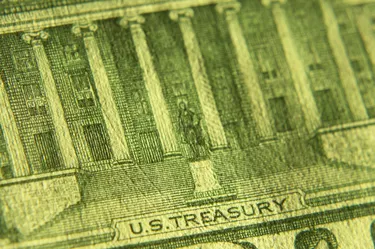
Any investment professional will tell you unequivocally that Social Security alone isn't enough to ensure a person a comfortable retirement. Any retirement portfolio should consist of a mix of stocks, annuities, retirement saving accounts and U.S. Treasury bonds, bills or notes. Treasury bonds, bills and notes are also known as Treasury instruments. In finance, an instrument is a real or virtual document that represents a legal agreement having a monetary value, as all Treasury instruments do.
Treasury Instruments
Video of the Day
The U.S. Treasury periodically needs to borrow money to finance the operation of the government. When the Treasury needs to borrow money it issues instruments called bills, notes or bonds, each of which are basically nothing more than an "I owe you." All Treasury instruments also have defined maturity ranges. In addition, each Treasury instrument has a certain denomination attached to it. For example, a Treasury bill, or "T-bill," is a short-term instrument that's worth $1,000 and matures within a year.
Video of the Day
Treasury Instrument Issuance
Treasury instruments are issued through an auction process. T-bills, which are short-term in nature, are mostly auctioned on Mondays. Four-week T-bills, meaning they mature in 4 weeks, are auctioned by the Treasury on Tuesdays. Treasury notes and bonds are auctioned as needed and pay face value at their maturity date. All T-notes and T-bonds pay a stated interest rate on a semi-annual basis. T-bills are sold at a discounted rate; with a typical $9,700 1-year T-bill paying about $10,000 at maturity.
Buying Treasury Instruments
All standard Treasury instruments are available for sale to the general public through the U.S. Treasury's TreasuryDirect program. Treasury instruments sold through the TreasuryDirect program come with no fee or a low fee, depending on the instrument purchased. You can also purchase U.S. Treasury instruments through banks and brokers, though they'll typically charge a commission fee. If you buy Treasury instruments through banks or brokerages, normally you also have to open an account.
Considerations
All Treasury instruments are negotiable, meaning they can be sold at any time at a price you negotiate for with a willing buyer. "Treasuries," as Treasury instruments are usually called, can also be pledged as collateral for things such as loans. Treasury instruments purchased through the TreasuryDirect program, though, can't be pledged as collateral in some cases. Treasury instruments are also considered the safest investment in the United States because they're backed by the full faith and credit of the nation itself.